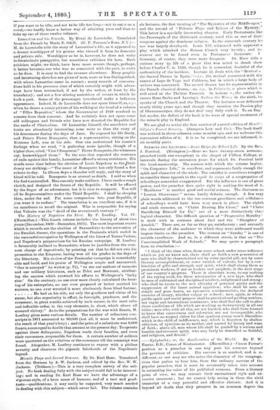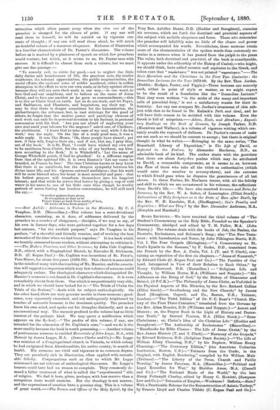—Ephphatha ; or, the Amelioration of the World. By F.
W. Farrar, D.D., Canon of Westminster. (Macmillan.)—Canon Farrar's position as a preacher in one way puts his sermons beyond the province of criticism. Ills success is so marked, and is so different, as one may see who notes the character of the congrega- tions that gather to hear him, from the ordinary success of the popular preacher, that it must be necessarily taken into accoant in estimating the value of his published sermons. From a literary point of view, we may censure their unchastened style and ex- cessive ornament ; but we cannot help seeing in them the vivid transcript of a very powerful and effective rhetoric. And it is beyond all doubt that they preserve in no common degree the
attraction which often passes away when the viva vox of the preacher is changed for the silence of print. If any one will read them to himself, he will be carried on by vigorous cur- rents of thought ; if any one will read them aloud, he will catch no doubtful echoes of a sonorous eloquence. Richness of illustration is a familiar characteristic of Dr. Farrar's discourses. The volume before us is marked by a plainness of speech on which few preachers would venture, but which, as it seems to us, Dr. Farrar uses with success. It is difficult to choose from such a volume, but we must give one fine passage :—
" To remedy evil, to strive for good,—not to neglect the little daily duties and beneficences of life, the gracious acts, the tender courtesies, the tolerant appreciations, the public magnanimities, the social efforts, the national aims of nobler manhood, either in selfish absorption in the effort to save our own souls, or in fury against others because they will not save their souls in our way,—in one word, to love God and our neighbour, and to believe on the name of Jesus Christ, and to love one another as he gave us commandment,—this is to live as Christ lived on earth. Let us do our work, and let Popes, and Sadducces, and Pharisees, and Inquisitors, say their say. It may be that there is danger sometimes for the humanitarian, the philanthropist, the reformer, lest, in vast strivings for the good of others, he forget that the motive power and purifying element of such work can only lie in personal devotion to his Saviour, in personal communion with his God. ' Are you not afraid of neglecting your own soul amid your labours for the negroes ?' asked one, of Clarkson, the abolitionist. I leave God to take care of my soul, while I do his work,' was the reply. On the lips of a truly good man, it was a noble reply. It was like Moses, Oh, these people have sinned ; yet now, if thou wilt, forgive their sin ; and if not, blot me, I pray thee, out of thy book.' It is St. Paul, I could have wished my own self to be anathema from Christ, for the sake of my brethren, my kins- men according to the flesh.' It is Whitefield's, Let the name of George Whitefield perish, if God bo glorified.' In a different region from that of the spiritual life, it is even Danton's Let my name be branded, so France be free.' The true Christian knows or may know that there is no antithesis, but the deepest sympathy between his divine inner life, and his vigorous outward usefulness ; that his work will be most blessed when his heart is most merciful and pure : that his holiest prayers will transform themselves into his happiest labours; and that while he serves God better by giving a cup of cold water in his name to one of his little ones than though he weekly partook of seven fasting but loveless communions, he will still need the cry,—
'0 perfect pattern from above, So strengthen ns that ue'er Prayer keeps us back from works of love, Or works of love from prayer.' "
—Rest Awhile : Addresses to Toilers in the Ministry. By C. J. Vaughan, D.D. (tMacmillan.)—This volume has a semi-devotional character, consisting, as it does, of addresses delivered by the preacher to a number of clergymen,—disciples, if we may so say, of his own in former days, who were gathered together for a few days last autumn, "for the twofold purpose," says Dr. Vaughan in his preface, "of a cheerful and friendly reunion, and of reviving the best memories of the time when we had been together." It is a book which we heartily commend to our readers, without attempting to criticise it. —The Modern Pharisee, and Other Sermons, by John Cole Coghlate D.D., edited, with a Biographical Sketch, by Hercules H. Dickinson, D.D. (C. Began Paul.)—Dr. Coghlan was incumbent of St. Peter's, Vero Street, for about five years (1873.78). This church is associated in the minds of many with the teaching of Mr. Maurice, and the associa- tion will suggest a comparison which very few volumes of sermons could adequately endure. The theological character which distinguished Dr. Maurice's sermons is not found in Dr. Coghlan's discourses. It is even remarkably absent from them. One which is unquestionably very able, and in which we should have looked for it—" The Trials of Christ the Trials of the Serious,"—deals with its subject nntheologically. On the other hand, there are very genuine merits in these sermons ; good- sense, very vigorously exorcised, and not unfrequently brightened by touches of sarcastic humour, is the dominant quality. The preacher knew his own mind, and spoke out his thoughts distinctly, and in an unconventional way. The memoir prefixed to the volume has no little interest of the pathetic kind. We may quote a notification which appears on the fly-leaf,—" The profits of this volume, if any, are intended for the education of Dr. Coghlan's sons,"—and we do it the more readily because the book is worth possessing.—Another volume of posthumous sermons is entitled Memorials of John Legge, M.A., with Memoir by James Legge, M.A. (James Clarke and Co.)—Mr. Legge was minister of a Congregational church in Victoria, to which colony ho had emigrated from Aberdeenshire, his native county, in search of health. His sermons are vivid and vigorous in no common degree. They are peculiarly rich in illustration, often applied with remark- able felicity. Congregations such as that to which Mr. Legge ministered are not tolerant of untheological discourses. Mr. Legge's hearers could have had no reason to complain. They commonly de- mand a fuller treatment of what is called the "experimental " side of religion. We find it here, given, perhaps, with less reserve than a scrupulous taste world exercise. But the theology is not narrow, and the expressions of emotion have a genuine ring. This is a volume of great worth.—The Person and Offices of the Holy Spirit, by the Very Rev. Achilles Daunt, D.D. (Hodder and Stoughton), contains six sermons, which set forth the doctrinal and practical aspects of the subject with no little eloquence and force. Those who remember the preacher will infallibly miss no little of the charm and .power which accompanied his words. Nevertheless, these sermons retain more of the characteristics of the spoken words than-commonly re- mains in a sermon when it has passed from the- pulpit to the press The value, both doctrinal and practical, of the book is considerable. It appears under the editorship of the Bishop of Cashel,—,who might, we should think, have added accents and aspirates to the Greek, and taken care that "Tapo:eaeats " was not printed "vraposlowis."—The Stoic Moralists and the Christians in the First Two _Centuries : the Donnellan Lectures for the Year 1879-SO. By the Rev. Thos. Jordan. (Dublin : Hodges, Foster, and Figgie.)—These lectures are scarcely such, either in point of style or matter, as we might expect to be the result of a foundation like the " Donnellan: Lecture." That they were written "in the midst of the many .and important calls of parochial duty," is not a satisfactory reason for their in- feriority. Let any one compare Mr. Jordan's treatment of this sub- ject with that to be found in Dr. Kalisch's Path, and Goal, and he will have little reason to be satisfied with this volume. Even the Greek is full of misprints.—Adam, Noah, and Abraham ; Bigoosi- tory Readings on the Book of Genesis, by Joseph Parker, D.D. (Macniven and Wallace), is a volume of vigorous writing which cer- tainly avoids the reproach of dullness. Dr. Parker's canons of taste are not such as we should be content to accept ; but there is original thought in what he writes.—Belonging to the same. series, "The Household Library of Exposition," is The Life of David, as Reflected in the Psalms, by Alexander Maclaren, D.D., an admirable book of its kind. The author starts with the postulate that there are about forty-five psalms which may be attributed to David, a reasonable compromise, as it seems to.us, between the Plow of those who take all the titles as authoritative (which would raise the number to seventy-three), and the extreme to which Ewald goes when he disputes the, genuineness, of all but eleven. In these Psalms, Dr. Maclaren traces, with all the felicity and skill to which we are accustomed in his volumes, the-reflections from David's life.—We have also received Sermons and Notes for Sermons, by the Rev. W. A. Salter, of Leamington (Elliot Stock); Intimations of Holy Scripture as to the State of Man after Death, by the Rev. W. H. Kerslake, M.A. (Skeffington) ; Sin's Penalty and Expiation : What are They ? by the Rev. Alexander Anderson, M.A. (Simpkin and Marshall.)



































 Previous page
Previous page